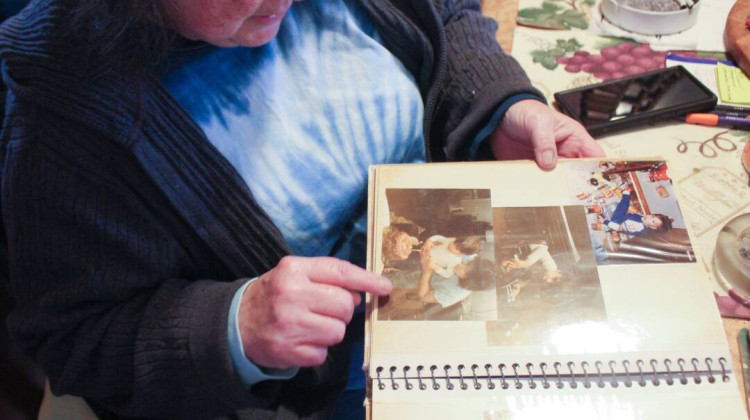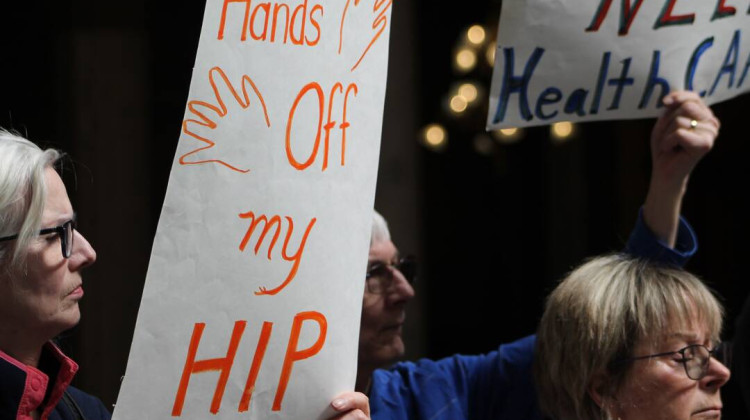
The Saline County Health Department in Marshall, Missouri which has seen a COVID-19 outbreak tied to meat processing plants.
Sebastian Martinez Valdivia/Side Effects Pubic MediaGlenda Cervantes’s work at the Saline County Health Department usually involves helping people see if they qualify for social services. But for the last two months she’s been responding to the local COVID-19 outbreak instead. “I still remember the day they said we got our first positive and we’re going to need someone’s help," she says.
The county has one of the highest COVID-19 rates in Missouri. That’s due in part to big meat processing plants in Marshall, the county seat. More than 250 people in the county have tested positive, and two have died.
Recently, Cervantes has been doing contact tracing; calling people who have tested positive and anyone they’ve come into contact with. Because she lacks a medical background, she’s been learning on the job and at times it’s been overwhelming.
“It got to the point where we couldn’t even use our lines anymore, so we started using our cell phones so I tell the nurses now, everybody in the county has my phone number now," she says.
Cervantes also has a valuable skill: She was born in El Salvador and is a native Spanish speaker. So she’s been translating health department information for the many workers who are immigrants.
While Saline county has two Spanish speakers on staff, other rural health departments aren’t so lucky.
An hour north of Kansas City in St. Joseph, nearly 700 people have tested positive for COVID-19. More than 400 work at a local meat processing plant.
City health director Debra Bradley had to ask a state agency for translating help.
“Which was really great because one of the individuals spoke spanish and so that helped out because there’s a large number of individuals who work at Triumph that are Spanish-speaking," Bradley says.
Missouri health director Randall Williams says his department is now providing translation services from the state capital in Jefferson City, instead of sending staffers out to overwhelmed health departments. At a recent press briefing, he explained, “Some will want us to send boots on the ground but in that case it was very interesting; we found that we needed to keep some people back because here in Jeff City, we have access to multiple translators.”
There are also some resources for health departments beyond the state level.
Lori Freeman heads the National Association for City and County Health Officials. She says the Centers for Disease Control and Prevention has provided support for health departments dealing with meat processing outbreaks. But she says more is needed.
“Over the past 10 years or so, our local health departments have lost about a quarter of their workforce due to fiscal austerity, budget cuts, and lack of overall resources and support," she says.
Freeman says these departments typically have experience in contact tracing for diseases like Hepatitis and HIV-AIDS. But budget, cuts have left them in a difficult position when it comes to dealing with big surges in cases.
For Cervantes, the surge in Saline County meant she was essentially always on call for COVID-19 patients. “There was one day that at 2:30 a.m. I receive a call, and I got up and I answered the questions, you know, I was just like I’ve got to help them.”
Cervantes says being the point person for so many requests was tough on a personal level, especially as a member of the town’s Latinx community.
“I always tell them, it takes a lot for me to cry but at first it was really hard," Cervantes says. "There’s people that I know, personally, and I feel like oh my gosh, you know like nobody knows exactly how bad this is."
Still, Cervantes says she’s grown from the experience. And now that the rate of new county cases has leveled off after spiking in late April and early May, she hopes the worst is over.
This story was produced by Side Effects Public Media, a news collaborative covering public health.
 DONATE
DONATE






 Support WFYI. We can't do it without you.
Support WFYI. We can't do it without you.